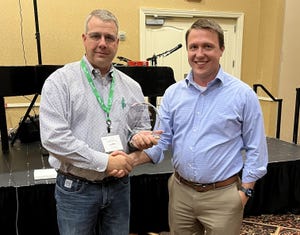April 3, 2012

Since 1997, Illinois livestock producers have been offered the Certified Livestock Manager Training (CLMT) program, managed by Ted Funk, an agricultural engineer and Extension specialist in the Department of Agricultural Engineering at the University of Illinois.
“The Livestock Management Facilities Act was passed in Illinois in May 1996,” Funk says, “requiring certification in livestock manure management for producers with more than 300 animal units. Certification must be renewed every three years, and a producer with 300 to 999 animal units can choose from three options: attend a CLMT workshop, take a series of five quizzes on the Internet (www.livestocktraining.com), or pass the written exam given by the Illinois Department of Agriculture (IDOA). Producers with more than 1,000 animal units must attend the workshop or take the quizzes and pass the IDOA’s written exam.”
Funk helped write the original curriculum for the workshops, and this curriculum was updated and used each year until 2000. “I would estimate we’ve seen more than 3,000 different people since our first year of operation,” Funk says. “The response of the livestock producers was exemplary when we started. They wanted to make a good faith effort to get the certification process going. I give them a lot of credit.”
In 2000, the University of Illinois collaborated with other land-grant universities and the U.S. Department of Agriculture to write and test the Livestock and Poultry Environmental Stewardship National Curriculum, which is the current manual and source of state test questions. In 2002, the online quizzes were approved by the IDOA as an alternative to workshop attendance.
About a dozen workshops are held across the state from December through March.
Warren Goetsch, bureau chief of Environmental Programs for the IDOA, has supported the training program since its inception. “Livestock production has certainly changed considerably over the past 15 years. From its beginnings until today, this program continues to provide livestock producers an opportunity to study the latest materials about the proper use and application of livestock manure and to demonstrate their commitment to environmentally responsible management of their production facilities.”
Funk estimates that more than 3,000 different people have gone through the training program since 1997. “We probably see 10 to 20% new people each year, and the test pass rate has increased steadily around the state,” he says. “We’ve introduced new technologies in areas such as odor control, carcass management and proper procedures for new construction.
“I believe the workshops have increased competence in environmental protection and helped reduce the environmental impact of manure handling procedures,” Funk concludes. “Producers don’t get into the business to manage manure. They see it as a cost, so we do everything we can to help them improve their manure management.”
You May Also Like



